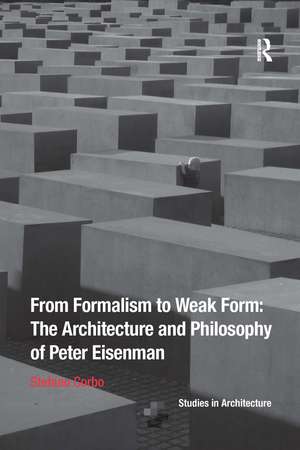From Formalism to Weak Form: The Architecture and Philosophy of Peter Eisenman
Autor Stefano Corboen Limba Engleză Paperback – 18 dec 2020
Preț: 309.41 lei
Nou
Puncte Express: 464
Preț estimativ în valută:
59.21€ • 61.74$ • 49.21£
59.21€ • 61.74$ • 49.21£
Carte tipărită la comandă
Livrare economică 20 martie-03 aprilie
Preluare comenzi: 021 569.72.76
Specificații
ISBN-13: 9780367738570
ISBN-10: 0367738570
Pagini: 152
Dimensiuni: 174 x 246 x 8 mm
Greutate: 0.26 kg
Ediția:1
Editura: Taylor & Francis
Colecția Routledge
Locul publicării:Oxford, United Kingdom
ISBN-10: 0367738570
Pagini: 152
Dimensiuni: 174 x 246 x 8 mm
Greutate: 0.26 kg
Ediția:1
Editura: Taylor & Francis
Colecția Routledge
Locul publicării:Oxford, United Kingdom
Cuprins
From Formalism to Weak Form: The Architecture and Philosophy of Peter Eisenman
Notă biografică
Stefano Corbo is an Italian architect and researcher at ETSAM Madrid (Escuela Técnica Superior de Arquitectura), where in 2010 he received a MArch II in Advanced Architectural Design; at the same Institute he is currently a PhD Candidate, with a dissertation entitled: 'Archaeology of Infrastructures: A conceptual cartography'. Stefano Corbo has worked as Assistant Professor at the Faculty of Architecture in Alghero, Italy, and lectured at the ETSAM, University of Miami, and University of Wisconsin. In 2012, after collaborating with Mecanoo Architects (Delft, Netherlands), he founded his own office: SCSTUDIO Architecture and Design (www.scstudio.eu ), a multidisciplinary network practicing architecture and design, preoccupied with intellectual, economical and cultural context. He has contributed to several journals (Mark, CIRCO, CLOG, Il Giornale dell’Architettura, Dichotomy, Studio Magazine, Tremors) and his projects have been published worldwide.
Recenzii
'Despite his significant impact on architecture through both built and theoretical works, most studies of Peter Eisenman's career focus on either one aspect or the other. In From Formalism to Weak Form: The Architecture and Philosophy of Peter Eisenman, Stefano Corbo attempts to redress this balance, connecting themes in the design and the theory of the influential architect across the many stages of his 50-year career.' arch daily
Descriere
Eisenman has always been deeply interested in the problem of form in architecture and has constantly challenged the classical concept of it. He tried to connect his own work with the cultural manifestations of the time: firstly under the influence of Colin Rowe and his formalist studies; secondly, by re-interpreting Chomsky’s linguistic theories; i
